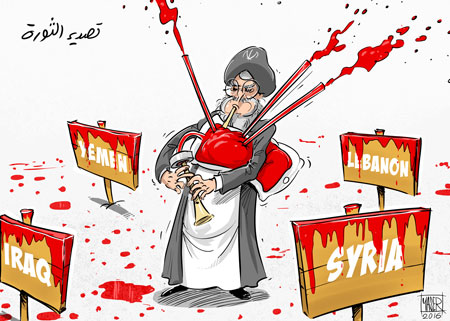Iran’s Khamenei — the Middle East’s Hitler?/خامنئي إيران هتلر الشرق الأوسط
Dr. Majid Rafizadeh/Arabnews/November 28/17
In an interview with The New York Times, published last Thursday, Saudi Arabia’s Crown Prince Mohammed bin Salman called Ali Khamenei, the supreme leader of Iran, “the new Hitler of the Middle East.”
While any comparison between Khamenei and Hitler — or the Nazis and the Iranian regime — infuriate proponents of that regime, the crown prince’s analogy is in fact well-grounded and legitimate, based on Khamenei’s modus operandi and the history of his three-decade rule.
Here are some underlying reasons to support such an analogy: First of all, Hitler was a fanatic ideologue who believed his ideology to be superior to any other. From Khamenei’s perspective, his philosophy and theocratic system of rule are the cornerstones of an ultimate system of governance. He and his fanatical party revolted and later resorted to significant violence to effectuate their revolutionary beliefs.
Once he was in charge of the Nazi Party, Hitler established two notorious organizations, the SA and the SS; agencies of terror tasked with surveillance and security who helped to control society and infiltrate other governments. Similarly, Khamenei supported the establishment of the Revolutionary Guard Corps (IRGC), its extraterritorial unit the Quds Force, and its volunteer paramilitary group, the Basij, to accomplish similar missions. Khamenei empowered the military, local militias, and the intelligence ministry.
Secondly, Hitler subscribed to fascism. Fascism has two important pillars: It is “a system of government marked by centralization of authority under a dictator” and it relies on “violent suppression of the opposition, and typically a policy of belligerent nationalism and racism.” Khamenei’s rule is purely dictatorial. His rule is “legitimized” by the notion of Wilayat-e-Faqih, in which an imam is supposed to rule over the nation.
Intriguingly, while Hitler came to power thorough election and voting, Khamenei was appointed by a handful of people from his gilded circle. The Iranian people have no say in Khamenei’s rule, as he is the ultimate autocrat of the Iranian regime. He enjoys the final say in Iran’s domestic and foreign policy. Khamenei also has the power to enact or revoke any constitutional laws. He calls himself the representative of the yet-to-arrive Imam Mahdi and he believes that he has been appointed by God to rule until the Mahdi appears. From his perspective, his regime has to dominate the Middle East and beyond in order to provide the right environment for that event.
Third, any scholar who has studied Khamenei’s speeches carefully in the last three decades can observe that racism is a core tenet of Khamenei’s. He believes in Persian superiority over Arabs or other ethnicities. In a speech to women in Tehran, he explained why the Persian race is far superior to non-Persian races: “The European race is a barbaric race.
They have a nice polished outfit, nicely ironed clothes, nice ties, and wear nice perfumes, but their (race) has a barbaric nature which existed during history and still exists in them now. They murder people in cold blood, and Europeans and Americans beat women in their houses.”Through the IRGC, brute force, proxies and terrorist groups, Khamenei has exported his ideology and revolutionary principles to the region and even to Latin America and incited wars to dominate the social order in other countries.
Iranian Arabs are systematically discriminated against, executed and tortured under Khamenei’s rule. He has fully neglected the Arab and Kurd regions of Iran, where most of Khamenei’s wealth comes from. Nearly 90 percent of Iran’s oil revenues originate in the Arab Ahwaz region, while its population is ranked among the poorest in Iran.
Hitler did not limit his ideology to Germany. He believed he should spread it to the rest of the world. Similarly, Khamenei strongly advocates the use of hard power, war and violence to export his brand of Shiism abroad. In fact, that mission is part of Iran’s constitution. The preamble states that the constitution “provides the necessary basis for ensuring the continuation of the Revolution at home and abroad.” In addition, the preamble states that Iran’s Army and Revolutionary Guard “will be responsible not only for guarding and preserving the frontiers of the country, but also for fulfilling the ideological mission of (Shiite) jihad in God’s way; that is, extending the sovereignty of God’s (Shiite) law throughout the world … in the hope that this century will witness the establishment of a universal holy government and the downfall of all others.”
Through the IRGC, brute force, proxies, and terrorist groups, Khamenei has exported his ideology and revolutionary principles to the region and even to Latin America and incited wars to dominate the social order in other countries, including Syria, Yemen, Lebanon and Iraq.
When it comes to nationalism, like Hitler, Khamenei has frequently exploited nationalist sentiments to advance his parochial and authoritarian agenda. Khamenei has used nationalistic presidents, including Mahmoud Ahmadinejad and other military generals, as pawns to draw support for the regime by manipulating the people.
Khamenei’s policies, actions and words corroborate the analogy that he is the “new Hitler of the Middle East.” However, it is worth noting that Khamenei is, in some respects, more threatening. While Hitler was in a rush to rule the world, Khamenei is extremely patient, shrewder, more Machiavellian, dictatorial and manipulative. Before it is too late, the international community has to seize its opportunity, because if Khamenei and his regime are not confronted forcefully, he will likely turn the region into a conflagration to achieve his objectives.
*Dr. Majid Rafizadeh is a Harvard-educated Iranian-American political scientist. He is a leading expert on Iran and US foreign policy, a businessman and president of the International American Council. Twitter: @Dr_Rafizadeh




















